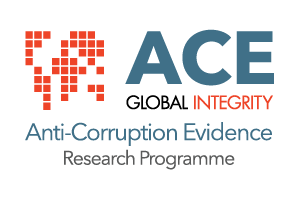Click here to access the GI-ACE 2020 Annual Report
Some five years ago, when I was giving oral evidence to the UK House of Commons International Development Committee, one Member of Parliament put it to me that they were ‘quite surprised, perhaps naively, to understand […] that further research is required to improve the evidence base on corruption. Corruption had been around since time immemorial. I would have thought there was plenty of evidence around. In what way do you think the evidence base needs to be strengthened, or is this just creating extra work for people who look at these things?’
Are those of us involved in GI-ACE guilty as charged or can we point to good reasons for engaging in more research on corruption? I believe that not only do we need more research, but also that we are learning important lessons from the projects we are currently supporting. Although it’s true that there has been masses of research on corruption, GI-ACE addresses a number of issues that have still not received sufficient attention – not least, because corruption does not remain static: as new opportunities arise, so do new manifestations and modalities of corruption, for example through exploiting technological changes in international finance linked to globalisation. Equally, there has been insufficient attention paid to how anti-corruption interventions have worked in practice.
Unlike much of the existing academic research, we are fully focused on
practical ways to tackle corruption, rather than just explain its existence or develop theories about why it happens. To do that, we focus on addressing actual problems rather than viewing corruption as some kind of generic issue, such as, stopping the loss of medicines in Malawi, or developing more effective systems to check beneficial ownership in Nigeria. We also take politics seriously and therefore target our work on identifying reforms that are feasible and viable rather than theoretical: for example, by using open data to identify the risk of corruption in aid procurement or by looking at how anti-corruption law enforcement can operate in practice in settings marked by high levels of informal governance, both in East Africa and Central Asia. And, of course, we seek to understand and identify the impact of anti-corruption reforms, for instance by tracking how training civil servants about ethics delivers results in Bangladesh and Nepal, or whether positive public recognition can enhance performance of local leaders in Uganda.
As outlined in our Annual Report, our current GI-ACE projects are providing new insights across a range of areas: from how to address the complex international framework of illicit financial flows by reforming financial secrecy regulations, to developing practical ways to recognise and promote integrity as an anti-corruption mechanism, using behavioural insights to tackle health-sector bribery, identifying measures to reduce the risk of corruption in procurement, and much more besides. As we witness the continued devastating impact of corruption in global responses to the COVID-19 pandemic, it is ever more obvious that we do indeed need further research into this most intractable question.

